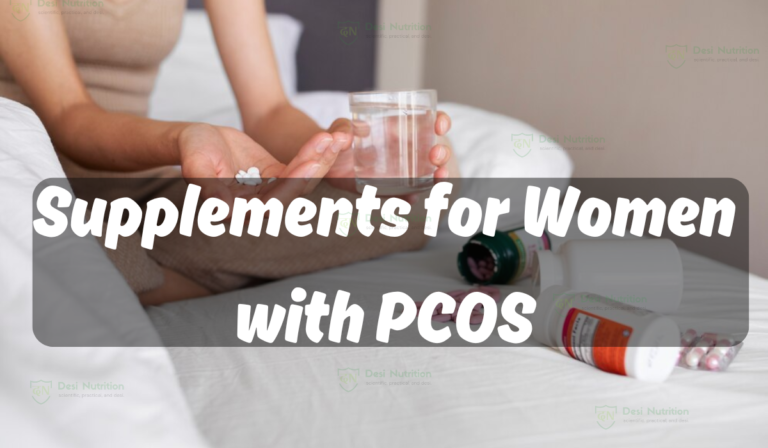In this article we will learn about the best supplements for women with PCOS and what they need to consider before taking them.
Polycystic Ovary Syndrome (PCOS) is a common hormonal disorder affecting millions of women worldwide. While the exact reason for PCOS is unknown, it could lead to multiple symptoms like weight gain, hormonal imbalance, irregular period, ecne etc. You can still manage PCOS by changing your lifestyle, including diet, physical activity, focusing on mental health etc.
When women find out they have PCOS they try a lot of things because of the worry they go through. But not every trick and tip works for everyone. Women need to understand that managing PCOS is challenging but you can do it with the right approach.
With dietary changes, women often turn to supplements for quick results. But adding supplements in your life should be because of the necessity and not because you want quick results.
Let’s begin with what you need to know first!
Understanding PCOS and Its Challenges

Let’s first understand how PCOS affects your body. Women with PCOS experience:
- Insulin Resistance: This is a key feature of PCOS, where the body struggles to use insulin effectively, leading to higher blood sugar levels.
- Hormonal Imbalance: Elevated levels of androgens (male hormones) can lead to symptoms like irregular periods, acne, and excess hair growth.
- Inflammation: Chronic low-grade inflammation is common in women with PCOS, contributing to symptoms such as fatigue and difficulty losing weight.
Lifestyle changes can help you manage PCOS and its symptoms. If you are considering adding supplements, they can definitely add additional support to manage the condition.
Key Supplements for PCOS Management

If you are thinking of opting for supplements you need to first know about the key supplements that your body needs while dealing with PCOS. Here is a list of some of the best supplements for women with PCOS:
1. Inositol

Inositol, specifically myo-inositol and D-chiro-inositol, is one of the most researched supplements for PCOS. It plays a critical role in improving insulin sensitivity and regulating menstrual cycles.
- Benefits:
- It helps to improves insulin sensitivity
- Inositol helps regulate menstrual cycles and ovulation
- It helps to supports mood and reduces anxiety symptoms
- It may improve fertility outcomes
- Considerations: Myo-inositol and D-chiro-inositol are often taken together in a ratio of 40:1 to mimic the body’s natural balance. Consult a healthcare provider to find the best dosage for you.
2. Omega-3 Fatty Acids

An important nutrient for your body, omega-3 fatty acids, found in fish oil, flaxseeds, and walnuts. These foods are powerful anti-inflammatory agents that help reduce the inflammation in your body which is the key reason for hormonal imbalance. For women with PCOS, omega-3s can help reduce inflammation, support heart health, and even improve insulin sensitivity.
- Benefits:
- Omega-3 fatty acids help to reduce inflammation and oxidative stress
- It helps support heart health, lowering the risk of cardiovascular issues
- Consuming it can also help to improves insulin sensitivity and may reduce androgen levels
- It enhances mood and may alleviate symptoms of depression
- Considerations: When choosing an omega-3 supplement, look for those containing EPA and DHA (the active forms found in fish oil) or opt for vegan options made from algae.
3. Vitamin D

Vitamin D is another essential nutrient you need to take to manage PCOS. The primary source of vitamin D is sunlight and some foods like oily fish, fortified foods, egg yolks etc. Sometimes you might face vitamin D deficiency which could be balanced by taking supplements. Taking vitamin D supplements is crucial because it helps in hormone regulation and insulin sensitivity. Low levels of vitamin D have been linked to increased risk of insulin resistance, weight gain, and fertility issues in women with PCOS.
- Benefits:
- Vitamin D supplements supports insulin sensitivity and blood sugar regulation
- Taking vitamin D will help improves mood and supports mental health
- Vitamin D is attributed to enhances fertility and supports menstrual regularity
- Considerations: A blood test can determine your vitamin D levels. Taking supplements according to your body’s needs. It is best to consider a doctor who can guide you with the appropriate intake of vitamin D supplement.
4. Magnesium
You would be surprised to know that magnesium is involved in over 300 biochemical reactions in the body, including regulating blood sugar, promoting relaxation, and supporting sleep. It’s particularly beneficial for women with PCOS due to its ability to enhance insulin sensitivity and reduce inflammation. Sometimes you might not get enough magnesium from your diet so you can add magnesium supplements in your diet.
- Benefits:
- Magnesium helps to improves insulin sensitivity and helps regulate blood sugar
- It helps to reduces inflammation and oxidative stress
- It also supports sleep, relaxation, and stress management
- Magnesium may help alleviate PMS and menstrual discomfort
- Considerations: You should know that magnesium citrate, glycinate, or taurate are highly absorbable forms. Women with digestive issues may want to avoid magnesium oxide, as it can cause stomach upset.
5. Zinc
Another crucial mineral for your body, zinc is a trace mineral that plays a role in immune function, hormone regulation, and skin health. It’s particularly helpful for women with PCOS who experience acne or hair thinning due to elevated androgen levels.
- Benefits:
- Consuming zinc can help reduce acne and improves skin health
- It helps to balance androgens, reducing symptoms like excess hair growth and hair thinning
- Zinc supports immune function and helps the body handle stress
- Considerations: Zinc can be obtained from foods like nuts, seeds, and whole grains, but supplementation may be necessary if you’re deficient. Excessive zinc intake can interfere with copper absorption, that is why you need to attain a balance.
6. Chromium
Chromium is a mineral that helps regulate blood sugar by enhancing insulin’s action. This mineral is important for women with PCOS because of the same reason. It will help with insulin resistance and managing weight.
- Benefits:
- Consuming chromium improves insulin sensitivity and supports blood sugar regulation
- It may aid in weight management by reducing cravings
- Chromium can help reduce cholesterol levels and supports heart health
- Considerations: Chromium supplements are generally safe, but long-term use in high doses should be monitored by a healthcare provider. Before opting for a supplement you should consult a healthcare professional.
7. N-Acetylcysteine (NAC)
NAC is a powerful antioxidant that helps detoxify the body and reduce inflammation. Women with PCOS need to curb inflammation that is why it is advised to choose NAC as a supplement which also supports liver function, which can help balance hormones in women with PCOS.
- Benefits:
- It helps in supporting detoxification and liver health
- It reduces inflammation and oxidative stress
- NAC may improve insulin sensitivity and regulate menstrual cycles
- NAC has been shown to improve fertility outcomes in some women
- Considerations: NAC is generally well-tolerated, but it’s essential to consult a healthcare provider to determine the right dosage, to manage PCOS.
8. Berberine
Berberine is a plant compound that has been shown to have similar effects to metformin, a common medication prescribed for women with PCOS. It helps regulate blood sugar levels, improves insulin sensitivity, and supports weight loss.
- Benefits:
- Berberine helps in improving insulin sensitivity and lowers blood sugar levels
- It may aid in weight loss by improving metabolism
- Barberine also helps to reduce cholesterol levels and supports heart health
- It shows potential in regulating menstrual cycles and improving fertility
- Considerations: Berberine can interact with certain medications, including blood pressure or diabetes drugs, so consult your healthcare provider before use.
What to Consider Before Taking Supplements for PCOS
1. Consult with a Healthcare Professional
While many supplements mentioned above are safe to take because they offer multiple benefits to manage PCOS. Now that you have a list of best supplements for women with PCOS, you need to make sure to add them only when advised. It is always safe to consult with a healthcare professional who could tell you which supplement is necessary for you and which one could be skipped. Consulting a healthcare professional also helps you to get an appropriate ratio of the supplements that you should take.
2. Understand the Dosage
Every woman who is going through PCOS needs to understand that their situation is different from other women with the same condition. That is why their need and dosage of the supplements would also vary. Your intake of the supplements rely on doctor’s prescription and you should follow the recommended guidelines.
3. Check for Quality
Supplements vary in quality as well. Not all supplements are created equal. Look for high-quality supplements that have been third-party tested for purity and potency. Supplements from reputable brands ensure that you’re getting a safe and effective product.
4. Be Patient
Women with PCOS need to be patient. You can’t expect results overnight. Sometimes you might have to commit to the supplements longer than you thought. Be patient and you will notice improvements in your body. Remember to be consistent and give your body time to adjust.
Frequently Asked Questions
Can PCOS be treated with supplements?
Ans. No, PCOS cannot be treated with supplements. However supplements are a way to add additional support to manage PCOS and its symptoms. Although, your main focus will be on the lifestyle changes like, dietary approach, physical movement, mental wellbeing; supplements will help to balance the nutrient deficiency, if any. You have been given a list of best supplements for women with PCOS which can help you manage the condition and the symptoms.
How to balance hormones in PCOS?
Ans. You need to stay healthy to manage hormones. For this you need to focus on consuming clean, natural and whole foods. Ensure you drink enough water and get enough sleep. Balancing hormones could be challenging at first but with the right lifestyle changes you can attain the desired results. Opting for some best supplements for women with PCOS is alos an option for you. For effective results, ensure to consult a healthcare professional.




